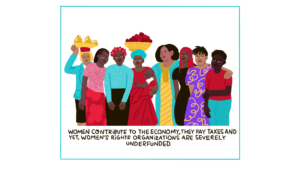Key information
Original title in Spanish: Creando espacio fiscal para garantizar el financiamiento de políticas feministas:
Lineamientos para promover reformas tributarias en el Sur Global
Region: Latin America
Countries: Argentina and Mexico
Researchers: María Julia Eliosoff Ferrero, Micaela Jazmín Fernández Erlauer, Sandhya S Iyer, Andrea Larios Campos, Noelia Méndez Santolaria, Celina Santellán and Malena Vivanco
Advocacy Summary
The paper focuses on Mexico and Argentina highlighting austerity measures, such as unequal tax systems and skewed income redistribution, which affect gender equality. These measures also lead to increasing the burden of care on women. The researchers emphasize how limited participation of women and the LGBTQIA+ communities in budgeting processes leads to the de- prioritization of their needs in the final budgets. The researchers recommend promoting progressive fiscal space for governments to fund feminist public policies.

Recommendations
- Shift the tax burden from those who have the least to those most able to contribute: Strengthen direct taxation by increasing capital gains tax and penalizing income from non-productive sources and sources harmful to the environment.
- Drive forward global taxes on wealth and corporate revenue, expanding the tax base and increasing the minimum tax rate to at least 25% to cover more multinational companies.
- Lessen the regressive effects of indirect taxes by redesigning the tax structure to protect the populations with the lowest incomes, in which women are overrepresented.
- Redirect public spending to feminist objectives: Reform fiscal policy to protect people with lower incomes and earmark resources for gender-responsive public policies, recognizing and valuing care work.
- Deepen international cooperation: Strengthen transparency and account- ability mechanisms to tackle tax avoidance and evasion, and democratize forums where taxation is discussed to ensure all countries and civil society can participate.
Authors

María Julia Eliosoff holds an undergraduate degree in Economics from the National University of the South (UNS) and is studying for a master’s in Gender, Society and Public Policy at the Latin American Faculty of Social Sciences (FLACSO) Argentina. She works as Project Coordinator for Economics and International Relations with the Friedrich Ebert Foundation in Argentina. In this role, she works on issues related to taxation and finance and coordinates the Forum for Fiscal Work for Equity (Espacio de Trabajo Fiscal para la Equidad, ETFE). She previously worked at the Ministry of Productive Development and the Energy Secretariat on production-related issues through a gender lens.
She is also a lecturer in Economics and Gender at the University of Buenos Aires and a member of the Society for Critical Economics (Sociedad de Economía Crítica) of Argentina and Uruguay.

Micaela Fernández Erlauer holds an undergraduate degree in Economics from the University of Buenos Aires and a master’s in Public Policy Design and Evaluation from the University of San Martín. She specialises in feminist macroeconomics, public finances and labour market inequalities. She works as an economics researcher at Fundar – a public policy design think tank – where she manages projects focused on feminist fiscal policy and macroeconomics. She is a member of Ecofeminita, a civil society organisation that aims to raise awareness about gender inequality. She previously worked in the Argentinian public sector as a consultant for multilateral and civil society organisations. She is a lecturer in Macroeconomics, Economics and Feminist Economics at several Argentinian universities.

Andrea Larios Campos holds an undergraduate degree in Economics from the Panamerican University and is studying for a master’s degree in Economics at the National Autonomous University of Mexico. She currently works as a researcher with the Fiscal Justice Programme at the Fundar Centre for Analysis and Research, where she focuses on driving forward the feminist fiscal policy agenda. In addition to researching fiscal justice from a human rights and gender perspective, she is a co-coordinator of the Feminist Fiscal Policy Network (Red por una Política Fiscal Feminista), a multidisciplinary forum for policy advocacy.

Noelia Méndez Santolaria holds an undergraduate degree in Economics from the University of Buenos Aires and is studying for a master’s in Economics at the same university. She specializes in feminist economics approaches to fiscal and macroeconomic analysis: taxation, spending, evaluation of investments in care policies, budgetary federalism and care funding. She has been a consultant and researcher for international and national bodies and civil society organizations.

Celina Santellán holds an undergraduate degree in Economics from the University of Buenos Aires. She is studying for a master’s degree in Public Policy at Torcuato Di Tella University and in Development Studies at the London School of Economics and Political Science. She specializes in feminist taxation. She coordinates the data team at Ecofeminita and has taught undergraduate and postgraduate classes on Feminist Economics. She currently works as Coordinator of the National Directorate of Economy, Equality and Gender of the Ministry of Economy of Argentina.

Malena Vivanco holds an undergraduate degree in Economics from the University of Buenos Aires. She is currently a researcher in Fiscal Justice at the Civil Association for Equality and Justice (Asociación Civil por la Igualdad y la Justicia, ACIJ). Her work combines research, delivering training, outreach and political advocacy to drive the shift towards fiscal systems that guarantee human rights and gender equality. She is also a member of the Forum for Fiscal Work for Equity (Espacio de Trabajo Fiscal para la Equidad, ETFE).




